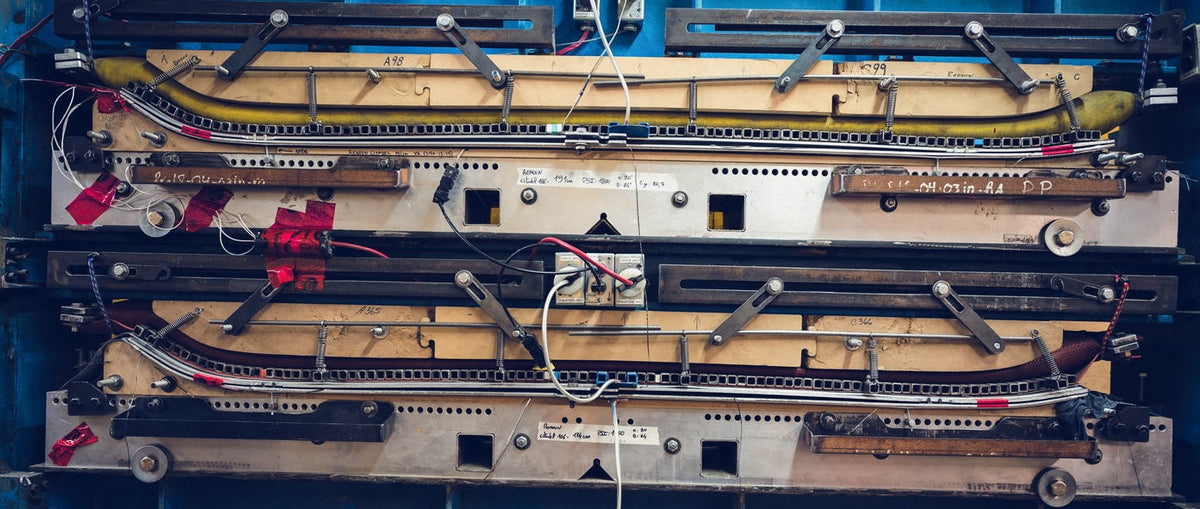
Titanal Explained: When Stability Meets Power
|
|
Titanal underfoot, full sheets of titanal, dual layer titanal construction…all frequent terms thrown around in ski product write-ups. But what, exactly, is titanal? And what does it really mean to have it in your skis? In short, it provides stableness and stiffness to a ski for an assertive ride without chatter. Let’s dig into all that entails.
Surprisingly, titanal isn’t actually constructed from titanium. It’s an aluminum alloy that has some traces of other metals, like copper, zinc and magnesium, a blend intended to enhance its performance qualities—mainly, strength and durability.
The alloy appears so often in skis, regardless of its placement, because of its somewhat oxymoronic ability to deliver both stiffness and damping. Due to this, it’s often found in skis intended for more advanced, aggressive riders.
Let’s start with titanal’s ability to increase stability. The metal alloy reduces vibrations at speed or on super hardpack, like on early morning runs. The rigid material absorbs and disperses vibrations, instead of letting them build in specific areas, like in the ski tip or underfoot. As such, the ride feels a little smoother when you hit the unexpected bumps and chop.
Stability also increases thanks to a decrease in torsional flex, or how much a ski twists. When a ski is very flexible from side to side, especially in firm snow, it creates instability—titanal serves to stiffen the ski, which minimizes some of that movement.
If all that wasn’t enough to look for some metal in your skis, the stiffness from titanal also gives better edge hold. The stiffness of a ski with titanal makes it easier for the skier to bite into the snow, especially on harpack, steep pitches, or when looking to really lean into a turn.
That stiffness also lends to more snap; with a stiffer ski, it’s easier to make sharper, more controlled turns thanks to more direct power transmission.
There are three ways that titanal is typically integrated into a ski: titanal underfoot, full sheets of titanal, and dual-layer construction. Titan underfoot is exactly what it implies: a sheet of titanal is placed centrally under the binding for the purpose of enhancing stability and power transfer where pressure is highest. All-mountain skis typically use this construction, as it allows for flexibility and playfulness in tip and tail with enough stability for varied conditions.
In full-sheet titanal construction, the metal is placed in a thin sheet throughout the entirety of the ski for the purpose of dampening and greater control from tip to tail. The result is a ski that’s overall stiffer than one with just titanal underfoot, and is a common construction for skis designed for advanced riders looking for some serious edge hold and stability at higher speeds.
Lastly, we have dual-layer construction, where there are two sheets of titanal placed within the ski—one above the core and one below. The goal here is to create a ski that is as stiff as possible, with a lot of torsional rigidity and edge hold. It’s a construction used for precision and power, for a very advanced, aggressive skier.
While titanal gives a boost to aggressive ski performance, the material isn’t necessary for every ski. The metal adds stiffness and weight, so beginners and intermediate skiers looking for a more playful, maneuverable option that requires less energy to control may want to avoid a ski with a lot of titanal throughout. And if you’re heading out of bounds, many touring skis avoid titanal in favor of lightweight materials, like carbon fiber, which adds stiffness without as much weight.
For those looking for stability at speed, edge control, and power transmission, keep an eye out for a pair of skis with some titanal embedded.
Which Renoun skis have titanal, you may ask? The answer is well, almost all of them! Every Renoun ski except the Citadel 107 includes at least a partial sheet of titanal. The Earhart 88 and Endurance 98 have partial sheets of titanal, while the Endurance 88 and Atlas 80 have two full sheets of titanal for extra stiffness on hard-packed groomers.
Renoun Skis Reviews team has over a decade of ski design and manufacturing experience, and decades of combined ski-industry experience ranging from certified PSIA ski instructors to shop technicians, racers, and coaches. We also have a deep passion for and love of all things skiing. The team utilizes this experience to provide unparalleled reviews that dive deep to help guide your purchase for just about any ski-related item and help inform you of any ski-focused tips and tricks about maintenance, on-hill performance, and even the best places to enjoy your Après-Ski. Through written and video content, the Renoun Skis Reviews team is here to help inform you on all things ski-related.
Our team curates recommendations based on an intensive research and review process and leverages our unique expertise in the industry. A product must be exceptional in quality and have unique features to qualify for consideration in our review process. For all tips and tricks, all advice is based on on-hill and ski manufacturing knowledge, as well as intensive research to ensure accuracy and help skiers like you stay informed.
To share feedback or ask a question about this article, send a note to our Reviews Team at info@renoun.com.




